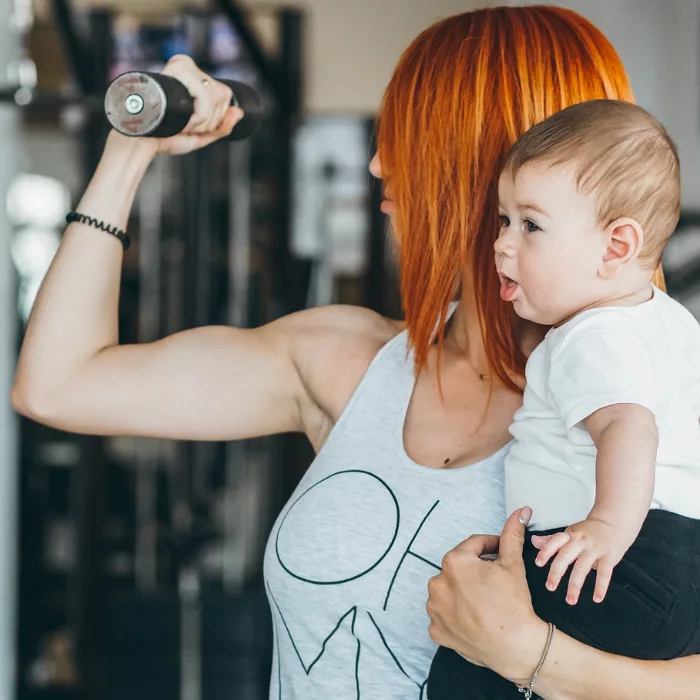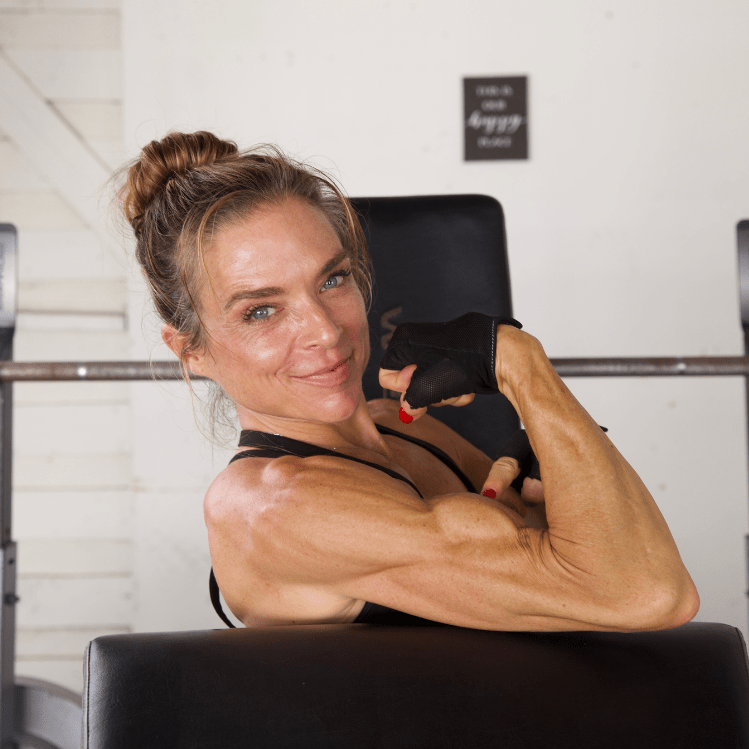
Jennifer Winestorfer: Shattering Limits and Thriving Beyond 40
At 48, Jennifer Winestorfer is proof that age is just a number when it comes to achieving fitness goals. A former competitive gymnast, marathon runner, and triathlete, Jennifer’s journey to peak health after 40 is nothing short of inspiring. After surviving a debilitating car accident and overcoming personal challenges, she found her true strength through weightlifting and strength training, transforming her body and mind in ways she never imagined possible. Today, she’s not only helping women half her age achieve their fitness goals, but also inspiring others to rediscover their potential and embrace the power of self-care, resilience, and authentic leadership. For Jennifer, it’s never too late to rewrite your story—and her journey proves that you can become the best version of yourself at any stage of life.
Jennifer, your motto, “It is never too late to be what you might have been,” is incredibly inspiring. What was the turning point in your life that made you fully embrace this belief?

The turning point in my life came a few years ago when I hit rock bottom. I was stuck in a job that I was good at but hated, constantly running myself ragged, driving over 1200 miles a week just to accommodate the demands of my ex-husband. I felt burned out, and disconnected, and honestly, I was losing my will to live. I wasn’t thriving—I was merely surviving.
At that lowest point, I prayed, asking God to help me become the right woman for the right man when the time came. I reached a place where I wanted to be alone or not alive at all because the life I was living didn’t feel worth it. But within a week, my college sweetheart, someone I hadn’t spoken to in over 20 years, reached out to me, and everything changed.
That reconnection sparked something in me. I realized I had been living for everyone else—accommodating other people’s needs, neglecting my own health and happiness. It was a wake-up call. I had the opportunity to change—to shift my perspective and choose a different path.
Around the same time, I was reading Untamed by Glennon Doyle, and a particular line hit me: “My kids don’t need me to save them. My kids need to watch me save myself so I can show them how.” That sentence was a breakthrough moment for me. It reminded me that to be the best version of myself, I needed to prioritize my well-being, embrace my growth, and live authentically.
That moment marked the beginning of my transformation. I realized it’s never too late to change, to become who you were always meant to be. Embracing this belief has been life-changing—helping me grow, reclaim my joy, and prioritize my happiness. It’s the driving force behind my journey now, and it’s why I live by the motto, “It’s never too late to be what you might have been.”
You faced a challenging battle with anorexia and have spoken about how it nearly took your life. How has that experience influenced your approach to fitness, nutrition, and self-care today?
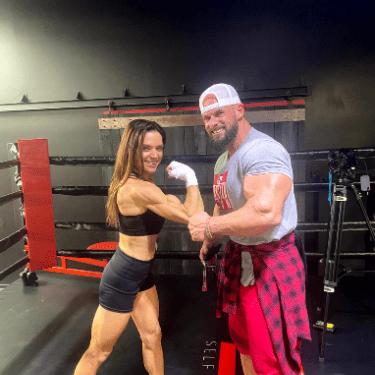
My battle with anorexia was one of the most challenging and life-altering experiences I’ve faced. It nearly took my life, and it forced me to confront the way I saw myself and the immense pressure we, especially as women, place on our external appearance. For so long, I thought my worth was determined by the number on the scale or how I looked in the mirror. Society often teaches us to define our value by our physical appearance, by how many likes we get on social media, or by how we compare to others. But I’ve come to understand that none of that truly defines us.
That struggle profoundly changed how I approach fitness, nutrition, and self-care today. Now, I see these things as acts of love and respect for the body I’m blessed with, the vessel that holds my spirit. Instead of focusing on punishment or striving to look a certain way, I focus on nourishing and honouring my body because it’s the only one I have. Fitness and nutrition have become about fueling my energy, building strength, and feeling vibrant—not about fitting into a certain mould.
When I shifted my mindset from focusing on external validation to embracing my true worth—my soul essence—it transformed how I approach every aspect of self-care. I no longer see exercise or healthy eating as a means to lose weight or achieve an idealized image of beauty. They are ways to show appreciation for myself and my body. And when we truly shift that perspective, the changes we want to see in our bodies begin to happen naturally.
The number on the scale doesn’t hold the same power over me anymore. I believe when we focus on self-love, care, and inner growth, our bodies respond in beautiful, positive ways. It’s a journey of small, consistent steps, not quick fixes. Women often come up to me and admire my physical appearance, and I love to share that it all starts from the inside. Real beauty radiates from a place of self-acceptance, love, and connection to something deeper than the surface.
Strength training transformed your life after age 40, especially after recovering from a severe car accident. What advice would you give to other women over 40 who may feel intimidated by starting a weightlifting journey?
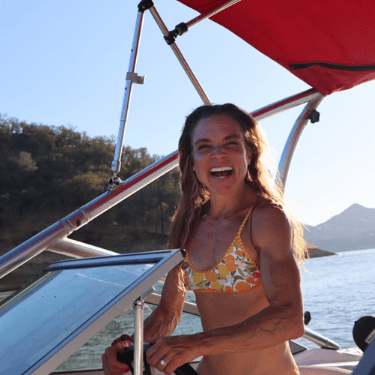
As we age, our bodies go through a lot of changes—hormonal shifts, energy decline, and the pressures of juggling careers, finances, family responsibilities, and relationships. We often put our own health on the back burner while taking care of everyone else’s needs. Society sometimes reinforces this idea, teaching women to prioritize others and think that self-care can wait until later—until after the kids graduate, after retirement, or when “this” or “that” happens. But in reality, that mindset subtly devalues our own worth and neglects the most important asset we have: our health.
When we get to our 40s and beyond, our health becomes even more essential. We want to stay active, mobile, and vibrant well into our 60s, 70s, and beyond. Unfortunately, many women wait until they’re struggling to move or feeling physically debilitated before they think about getting active. But I promise you, starting today, at any point, is the best investment you can make in your future.
Strength training has completely transformed my life, especially after recovering from a severe car accident. And I know it can do the same for other women who might feel intimidated by the idea of starting a weightlifting journey. My advice is simple: start where you are, with the body you have today. Don’t wait for the “perfect” time. Just like any important commitment—whether it’s your job, family, or relationships—put yourself on your calendar and make it a priority. You deserve that time, and your future self will thank you.
Strength training, particularly as we age, is a game-changer. It helps control our weight, improves body composition, boosts metabolism, and even elevates our mood and emotional well-being. But the key is consistency. Just like muscle atrophy if you stop working out, when you stop focusing on your health, it becomes harder to regain mobility and strength later on. The earlier you start, the more it will pay off in the long run.
So, my advice is: to take that first step, even if it’s small. Make time for yourself, and remember, you’re building a healthier, stronger future with each rep. It’s never too late to start, and you deserve to feel strong, capable, and confident at any age.
As a former competitive gymnast, marathon runner, and triathlete, how has your mindset as an athlete shaped your approach to overcoming life’s obstacles and reaching personal goals?
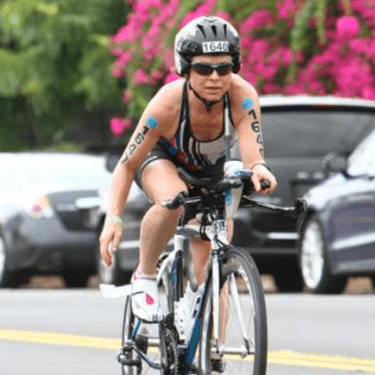
As a former competitive gymnast, marathon runner, and triathlete, the sports I’ve participated in have instilled powerful lessons that continue to shape my approach to life’s obstacles and my personal goals. From an early age, I learned the importance of self-discipline, consistency, and goal-setting. These are the foundational tools that have guided me through not only my athletic endeavours but also my professional and personal challenges.
One of the most valuable lessons I’ve learned over the years is the power of mindset. If I go into a competition or a challenge believing I will fail, then failure becomes almost a certainty. But when I use techniques like meditation and visualization—where I see myself succeeding, crossing that finish line, performing flawlessly, and feeling confident and relaxed—it shifts my entire approach. By consistently practising this mental rehearsal, I build confidence and mentally prepare myself for success in any area of my life. Visualization and meditation have become part of my daily routine, and over time, they’ve become second nature.
When I face a task that seems overwhelming or unachievable, I break it down into smaller, manageable goals. This process allows me to focus on what’s immediately in front of me, knowing that consistent progress, no matter how small, will add up. Over time, these small steps create big results, and when I look back, I can see how far I’ve come. It’s all about baby steps and keeping momentum.
Another key takeaway from my athletic career is the importance of having support. I’ve been fortunate to work with some of the highest-level coaches, nutritionists, and mentors, and I’ve learned so much from each of them. I understand now that I don’t have to do it all on my own. For me, asking for help is a strength, not a weakness. I’ve never been afraid to seek guidance when I need it, and I believe having a strong support system is critical for growth and success. There’s no such thing as a stupid question, and leaning on others has been invaluable to me in reaching my goals.
So, whether I’m preparing for an athletic challenge or tackling a major life goal, the lessons I’ve learned from sports—mindset, consistency, breaking down big goals, and seeking support—have been the keys to my success. It’s all about keeping forward momentum, one step at a time.
You competed in the Ironman World Championship alongside your father and later entered your first fitness competition at 46. What lessons did these experiences teach you about resilience, and how do you share them with your clients?
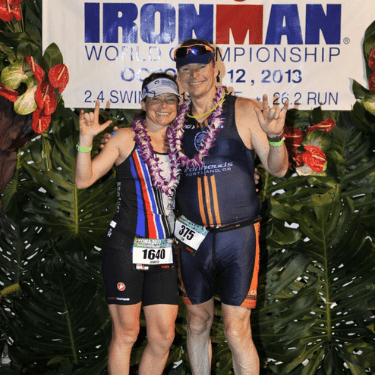
Competing in the Ironman World Championship alongside my father and later entering my first fitness competition at 46 taught me invaluable lessons about resilience, belief, and the importance of surrounding yourself with the right people. When I first set the long-term goal of qualifying for Kona, my coach didn’t believe it was realistic. She told me to focus on what was achievable at that moment. But I believed in myself, and I knew I could do it because I had already visualized myself achieving that goal. My coach didn’t have the experience of qualifying for Kona, and while she was a great coach, her perspective was limited by her own experiences, which were different from mine.
Despite my coach’s doubts, I trusted my own potential. I was athletically gifted and just had to work on my swimming. Once I overcame my fear of the water and learned how to swim properly, I knew I could do it. In 2013, I qualified for Kona at my second Ironman, while it took my father 20 years to qualify. That was a powerful reminder that resilience isn’t just about talent; it’s about persistence, belief, and not letting others’ limited perceptions define your own potential.
The key lesson here is that it’s important to find a coach who not only believes in you but also inspires you, trusts that you can achieve your goals, and is willing to connect you with specialists when necessary. Not every coach can take you to every level, and that’s okay. After realizing how quickly my body composition changed with strength training compared to endurance training, I set a new goal: to enter a fitness competition. I sought out the best coach I could find, someone who specialized in that area, and that was a crucial step in making my new goal a reality.
I share these lessons with my clients every day. I tell them that resilience is about finding your inner belief, setting clear goals, and committing to consistent action. It’s also about knowing when to seek out the right guidance and surrounding yourself with people who inspire you to push beyond your limits. I emphasize that we are often the sum of the people we surround ourselves with. If you surround yourself with winners, people who lift you up and challenge you, you’ll rise to that level. But if you stay in an environment that drags you down, it’s easy to lose momentum. Choose to be with people who inspire you, who show you what’s possible, and who believe in your potential even when you doubt it.
Many women struggle with prioritizing their own needs, especially later in life. How do you help women shift their mindset to put their health and happiness first?

Many women, especially later in life, struggle with prioritizing their own needs. We’re often taught to put everyone else first—our families, careers, and relationships—while neglecting ourselves. But I always encourage women to think of self-care like filling a cup. If our cup is empty, we can’t pour it into others. We have to fill our own cup first so that it overflows with love, energy, and positivity. When we nurture ourselves, we’re not trying to extract from others what we’re lacking. We’re whole, and we can give freely from a place of abundance, not scarcity.
This is where mindset comes in. We often give with the hope of filling some void in our lives, but that never works. It’s like trying to fill a “god-sized hole” with things or people that can’t fit. No matter how much we try, it leaves us disappointed and drained. True fulfilment comes from self-love and self-care—recognizing that we are as complete as we are.
When women take care of themselves—physically, mentally, and emotionally—it shows. It radiates in their attitude, confidence, and how they carry themselves. They stop looking for external validation or approval because they already know their worth. By prioritizing themselves, they set an example for those around them, teaching others how to treat them with respect.
Another important lesson I’ve learned over the years is that people will treat you as well as you treat yourself. If you don’t honour your own needs, others won’t either. So I encourage women to raise the bar and treat themselves with the care and respect they deserve. When you do this, the people in your life will either respect you and meet you at that level, or they’ll walk away—and that’s okay. We deserve to be surrounded by those who value us as much as we value ourselves.
You’ve been involved with organizations like NEDA and FBLA, advocating for awareness around eating disorders and other social issues. How do these causes resonate with your mission, and what messages do you hope to amplify through your work?
Being involved with organizations like NEDA and FBLA has been incredibly meaningful to me because it allows me to advocate for awareness around eating disorders and other social issues that are often misunderstood or overlooked. A lot of people are simply uneducated about eating disorders, and this lack of awareness can be especially harmful to athletes, young girls entering puberty, and even adults who are grappling with body image issues. As we grow older, body image becomes increasingly tied to self-worth, whether it’s about finding a partner or dealing with societal pressures. What we eat as children or the habits we develop early on can later impact our physical health and lead to unhealthy behaviours or extreme measures in pursuit of an unrealistic ideal.
The key message I hope to amplify is the importance of awareness and education. For me personally, I am very cautious about how I talk to others about their bodies. Everyone has different beliefs, experiences, and sensitivities based on their upbringing or past struggles, and something as simple as a comment about someone’s appearance could trigger a negative reaction or reinforce harmful patterns. This is why I strive to create a safe space where people feel empowered to speak openly without fear of judgment.
The statistics about body dissatisfaction are alarming—according to NEDA, studies show that 69-84% of women experience dissatisfaction with their bodies, desiring to weigh less than they do, while 10% to 30% of men also struggle with body image, often focusing on becoming more muscular. One study even found that 90% of boys were dissatisfied with their muscularity. These numbers underscore how widespread these issues are, affecting both genders and highlight the urgent need for awareness and change.
Through my work, I hope to help shift the conversation around body image by emphasizing self-love, mental health, and the understanding that our worth is not defined by a number on the scale or our physical appearance. I want to encourage people to focus on nourishing their bodies, not punishing them, and to embrace their uniqueness without comparison to unrealistic standards.
With experience across sales, operations, and entrepreneurship, you bring a business-savvy approach to fitness. How do you merge these skills with your passion for health and wellness to create impactful programs for your clients?
With my experience in sales, operations, and entrepreneurship, I bring a business-savvy approach to fitness that allows me to create impactful, results-driven programs for my clients. The key focus in my work is communication and customization because every individual has unique goals, needs, and challenges. While I can only be in one place at a time, I am leveraging technology to develop an interactive platform that allows clients to access online learning, courses, and one-on-one coaching. This platform will also offer a strong sense of community where clients can share experiences, set and track goals, and celebrate successes together.
By collaborating with other wellness professionals, I’m setting myself apart from traditional fitness coaches by emphasizing mindset and education as the foundation of any health program. Exercise and nutrition are only part of the equation; understanding the “why” behind the choices we make is crucial for long-term success. Through this approach, I aim to empower clients not just physically but mentally and emotionally, fostering a deeper connection to their wellness journey.
In addition to custom training plans for online, in-person, or hybrid programs, I’ll be offering a variety of courses on health and wellness topics. I’m also planning destination retreats, workshops, and speaking engagements where I can collaborate with other experts in the wellness space to create immersive, educational experiences. By integrating these elements, I can provide a holistic, personalized approach to fitness that supports every aspect of my clients’ well-being.
What role has your journey as a mother, especially having your second child at age 40, played in shaping your perspectives on women’s fitness, health, and wellness?
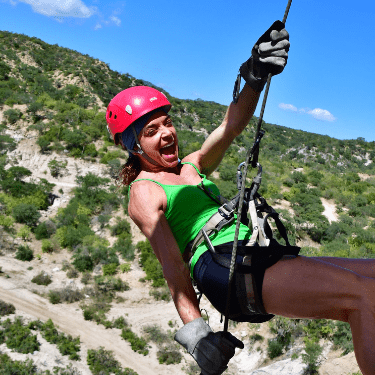
Having my second child at age 40, alongside navigating significant life changes, completely reshaped my perspectives on women’s fitness, health, and wellness. At that time, I wasn’t just becoming a mother again; I was also going through peri-menopause and then menopause, recovering from a c-section, undergoing hernia surgery, and facing a divorce. On top of that, I had to adjust to a new state, and I lost custody of my children because of the circumstances around their fathers and the state’s decisions. My entire life turned upside down—or rather, right side up—and I was given a fresh start.
While feeling sorry for myself and wondering if I’d made a mistake in moving, I remembered a powerful line from Glennon Doyle’s Untamed: “My kids don’t need me to save them. My kids need to watch me save myself so I can show them how.” That shifted my entire mindset. Several people also told me, “God is doing this for you, not to you,” and I began to realize that I was being allowed to prioritize my dreams and put my own needs first.
Fitness, for me, became a non-negotiable. It’s not a choice—it’s essential. But it starts from the inside. This is the core of my philosophy and the inspiration behind my company, Inside Out Enterprises. It’s also reflected in my brand, JenCalling, because this is my calling—helping women transform their lives by changing how they see themselves and the world around them.
Now, I focus on creating a life that’s true to myself, unapologetically so, and I’m living my dream to help other women embrace their transformation. My kids may not always be with me, but they see me prioritizing my happiness, my health, and my future. I’m building a legacy, not just for them, but for future generations to come. Fitness and wellness are the foundation of that legacy, and by taking care of myself, I show them how to do the same.
If you could give one piece of advice to a woman who feels she’s lost herself in seeking validation from others, what would you tell her to help her rediscover her worth and potential?
If I could give one piece of advice to a woman who feels she’s lost herself in seeking validation from others, it would be this: Stop living for other people. Show up for yourself. Every single day, look deeply into your eyes in the mirror and say, “You are beautiful, you are smart, you are important, and you are worthy of the best. I love myself today.” Repeat it every time you look at yourself in the mirror, until you truly believe it. You don’t need to hear it from anyone else, because you will already know it within yourself.
You are a child of God, and there is nobody on this earth who can be you better than you can. So stop trying to be anything other than who you are. The only person you are striving to be is a better version of who you were yesterday. Keep moving forward, one step at a time.
Surround yourself with women who lift you, inspire you, and encourage you without trying to change you. Remember, you are perfectly imperfect just as you are. Your worth and potential are already inside you, waiting to be revealed.
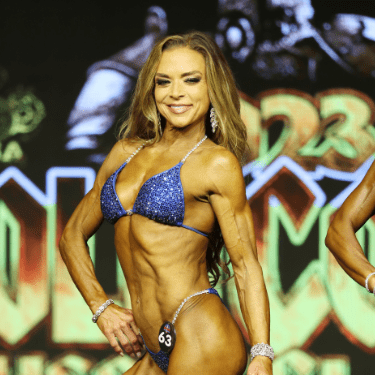
APPLY TODAY
100 Top Global Women Entrepreneurs – Global Woman Magazine
Our Journey in 12 Months:
Our Journey in 12 Months – Global Woman Magazine
5 Things That Show Money is Not Evil:
5 Things to Show That Money Is Not Evil – Global Woman Magazine
Global Man Magazine Page:
Global Woman, Global Man: Socials:
Global Woman Magazine (@global_woman.magazine) • Instagram photos and videos





